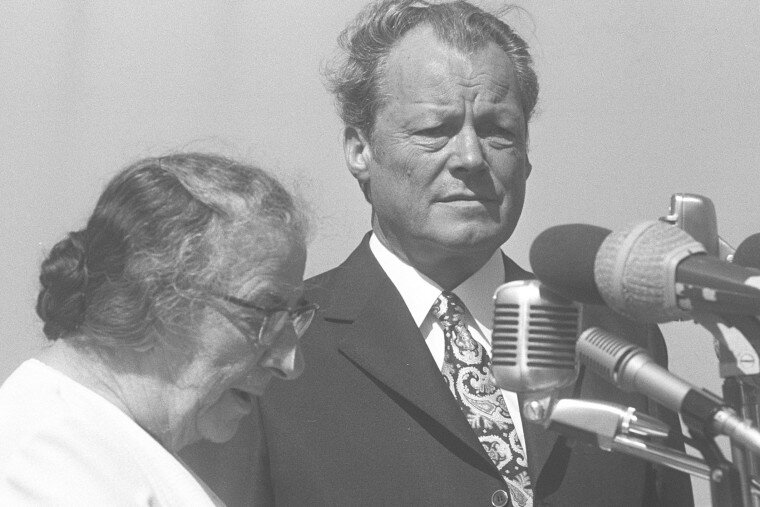West Germany and Israel experienced transformative relationships in the 1970s, when they were primarily linked to Holocaust heritage, security issues and changing global fate. West Germany and Israel established bilateral diplomatic relations in 1965, but the relationship between West Germany and Israel over the next decade was characterized by serious challenges and closely monitored political changes.
Important events, such as the attack on Israeli athletes in Munich in 1972, the Yom Kipur War in 1973, and the shaking effects of the oil crisis, were important turning points in bilateral relations.
Changing global and regional landscapes
The 1970s were characterized by global upheavals and rather monumental changes in geopolitical relations. The Cold War existed as an important political factor, and the US and the Soviet Union took away the unique position of leverage in the Middle East.
The 1973 Yom Kipper War (short for the October War) and the 1974 oil crisis not only had serious consequences for Israel, but also brought lessons to Israeli-Germany’s relationship. While major changes occurred in diplomatic relations between Germany and Germany and Israel based on positive relations with the West, some roots for inter-German relations have also developed.
Furthermore, the ongoing events related to the roots of the left-wing rebellion that began in Germany in the late 1960s were also associated with the ongoing process of Vergangenheitsbewältigung.
For Israel, it was definitely a decade of success and failure. In many respects, the Yom Kipper War revealed Israel’s vulnerabilities and issues in security strategies and planning. At least officially, the peace process with Egypt, which reached its peak in Camp David Accord (1978), promised regional stability, but also reflected the difficulty of Middle Eastern diplomacy.
It was contrary to this overview of the Middle East that Germany and Israel tried to create greater relations that are limited by both historical and political realities and global circumstances.
Munich Event (1972) and its impact on security cooperation between Germany and Israel
The 1972 Munich Olympics and the impact on security cooperation between Germany and Israel
One of the most decisive events of the decade was the attack on Munich during the 1972 Summer Olympics. Palestinian armed group Black September took 11 Israeli sportsmen hostages, leading to failed rescue operations by German security forces, leading to the deaths of all hostages.
The incident had a major impact on Israeli relations with Germany, highlighting the weaknesses of Germany’s counterattack measures and urged Israel to adopt a more aggressive approach to the global threat.
In the aftermath, Israel launched the “Raven of God’s Operation,” an intellectually-led mission to eliminate those responsible for the attack. Meanwhile, West Germany reevaluated its security policy and increased intelligence reporting cooperation with Israel.
The event also strengthened West Germany’s internal counterattack units, leading to the creation of the elite police unit GSG 9 in 1973.
The 1973 Yom Kipper War and the German Strategic Dilemma
The outbreak of the Yom Kipper War in October 1973 brought West Germany to diplomatic challenges. As Israel faced a surprising attack in Egypt and Syria, it sought military assistance from its western allies, including the US and European countries.
However, Arab oil producers have used the conflict to pressure European countries to adopt a more Pro-Arab stance by threatening oil embargoes.
West Germany was tied up under Prime Minister Willie Brandt. Germany had historical responsibility for Israel, but also had important economic ties to the Arab world. Unlike the United States, which provided military supplies directly to Israel, West Germany chose not to provide explicit military assistance.
Under Arab pressure, West Germany refused to grant access to West Germany’s air force bases to deliver supplies to Israel, but this opened a hole in short-lived German-Israel relations.
However, while not provoking the Arab world, West Germany has sought to hedge its position to provide economic and humanitarian aid to Israel. The war and the aftermath demonstrated the complexity of German foreign policy, where economics clashed with historical responsibility.
Willie Blunt and the rise of Ostopolitik
Willie Brandt, who served as West Germany’s prime minister from 1969 to 1974, was a key figure in shaping Germany’s foreign policy in the 1970s. His Ostopolitik policy sought to improve relations with the Soviet Union, including East Germany, and Eastern Europe. The policy focused primarily on Europe, but also influenced Israel’s relations with Germany.
Brandt’s Ostopolitik raised concerns with Israel about Germany’s priorities, particularly given the Soviet Union’s support for Arab countries. However, Brandt also reaffirmed Germany’s commitment to Israel and visited the country in 1973 to emphasize the importance of reconciliation. His leadership helped to strengthen the moral and political foundations of German-Israel relations.
Legacy of the 1970s
The 1970s brought about considerable changes in relations between Germany and Israel. Security cooperation deepened, while political and economic aspects led West Germany to a more practical Middle Eastern approach.
Ten years were set in future years based on the options presented to balance responsibility between historic relations with Israel and responsibility for the rapidly growing relations with the Arab world.
The 1970s also foresaw the development of European policies towards Israel. West Germany’s position influenced the greater subsequent policies of the European Economic Community (EEC), resulting in European involvement in Middle Eastern diplomacy.
By the end of the 1970s, West Germany will be a supporter of Israeli Arab conflict, while being a mediator of the Israeli Arab conflict, while still viewing the two positions it has built up as sustainable.

